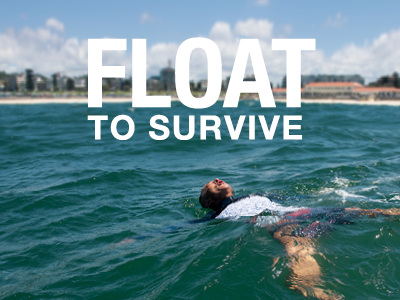Randwick City and Waverley councils launch Float to Survive to reduce national drownings
- Published Date
- 01/12/2022
- News Topic
- Beaches & Lifeguards

Randwick City and Waverley councils have joined forces to pilot a new water safety campaign aimed at reducing the record number of drownings in Australia.
Float to Survive promotes floating as the best chance of survival for swimmers who get into trouble in the water and will be launched today 1 December 2022, in partnership with the University of NSW (UNSW) Beach Safety Research Group for the start of summer.
Randwick City Mayor, Dylan Parker and Waverley Mayor, Paula Masselos, said the ‘Float to Survive’ message will be tested across the two local government areas which are home to some of Australia’s busiest and most dangerous beaches based on drowning risk.
This year Australia recorded its highest drowning rates in the last 10 years with 339 deaths and many of these drownings occurred at unpatrolled beaches, or out of hours, and in rivers and lakes.
“Our Float to Survive message is that if you can master the skill of floating, even if you are not a good swimmer, you are more likely to survive and be rescued,” Mayor Parker said.
Mayor Masselos said: “The one key message of this pilot campaign is ‘Float to Survive’ and we want to test the memorability of this message in our research”.
The Float to Survive message will be promoted over the 2023 summer period (November 2022-April 2023) alongside and complementing Surf Life Saving NSW’s traditional beach safety message ‘always swim between the flags’ and the summer 2023 rock fishing safety campaign.
Five steps to float:
- Keep calm and control your breathing
- Lean back
- Extend your arms and legs
- Gently rotate your arms and legs in a circular motion
- Signal for help with your hand if you can
Professor Rob Brander (aka ‘Dr Rip’), from UNSW’s Beach Safety Research Group will help evaluate the efficacy of the pilot campaign. In August this year, Randwick City and Waverley councils were approached by Surf Educators International seeking interest in a pilot study which has been adapted from the UK’s Royal National Lifeboat Institute.
Professor Brander said “the Float to Survive message has the potential to help those who find themselves on trouble in the water at unpatrolled locations or outside of patrol hours and locations. We want to see what the public thinks about the message”.
Randwick Council Beach Lifeguard Supervisor Paul Moffat said sometimes people who get into trouble in the water can swim, but they panic and try to swim against the current which tires them out.
“If you can relax and float, you’ll conserve energy and have a better chance of drifting out of a rip or being rescued," Mr Moffat said.
Bruce Hopkins, coordinator, Waverley Council Lifeguard Service, said learning how to float is easier than learning how to swim and “could be the difference between life and death”.
‘Float to Survive’ will be promoted in the media as well as in advertising and signage where people gather including beaches, bus stops, shopping centres and cinemas.
